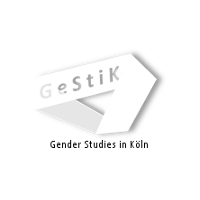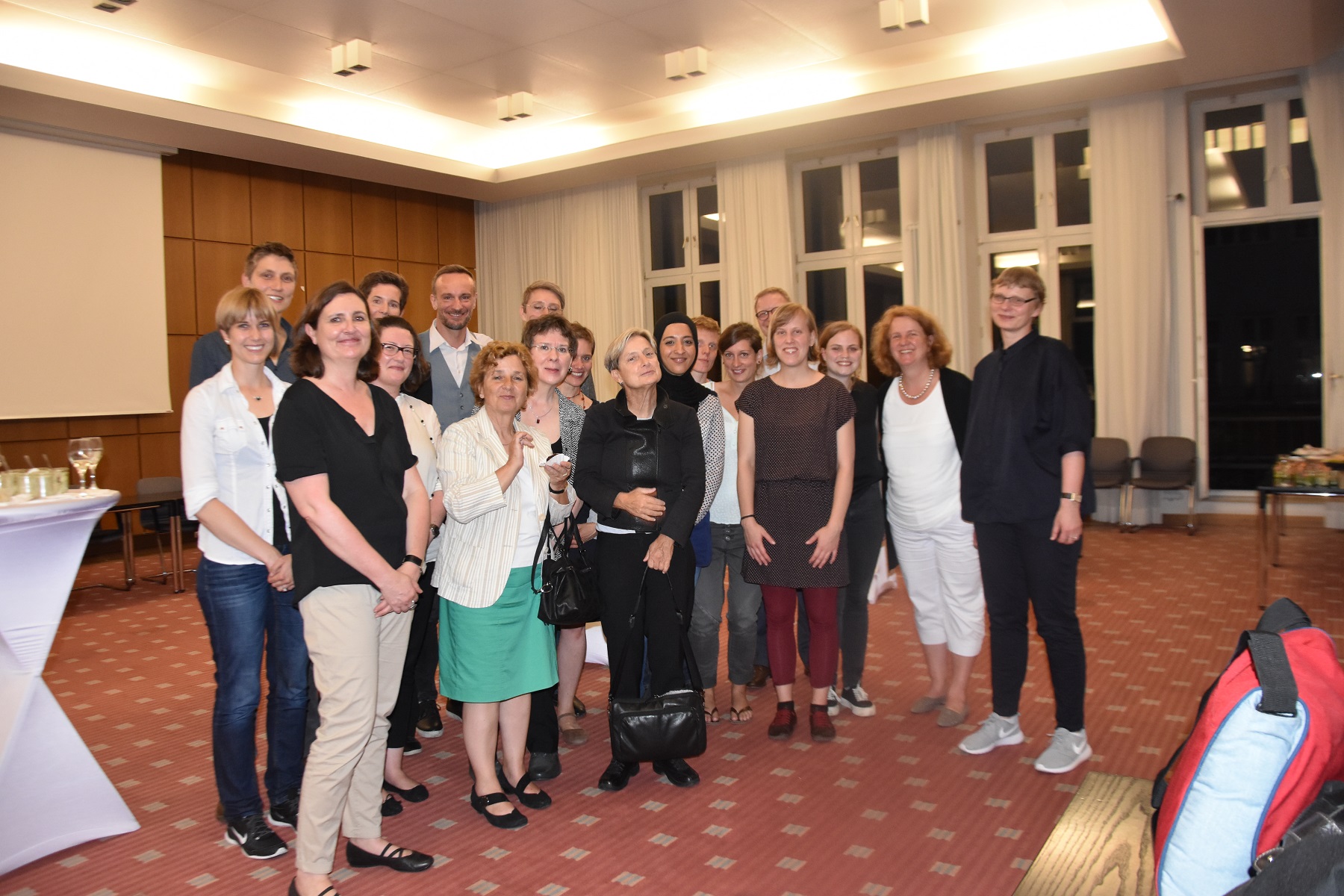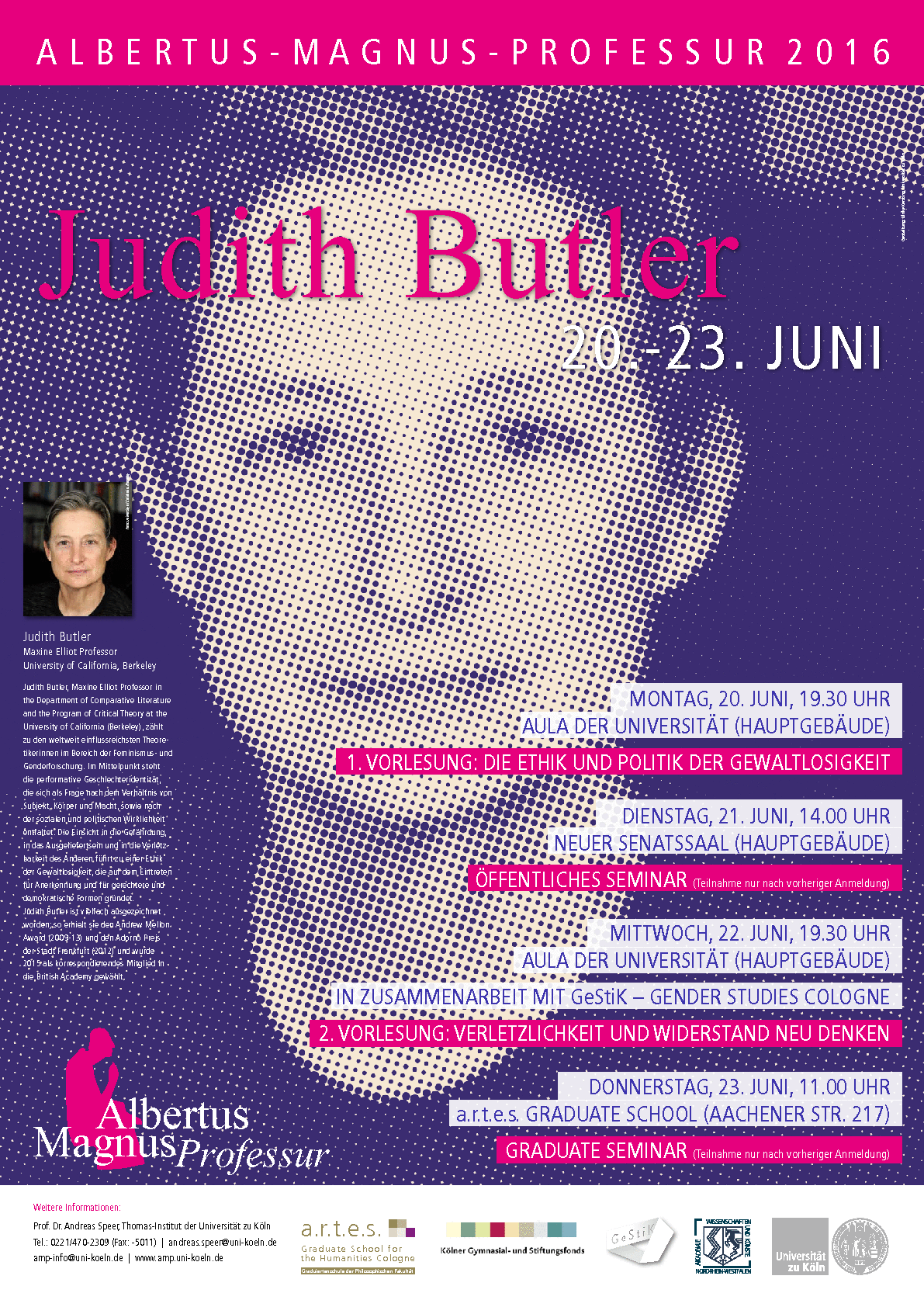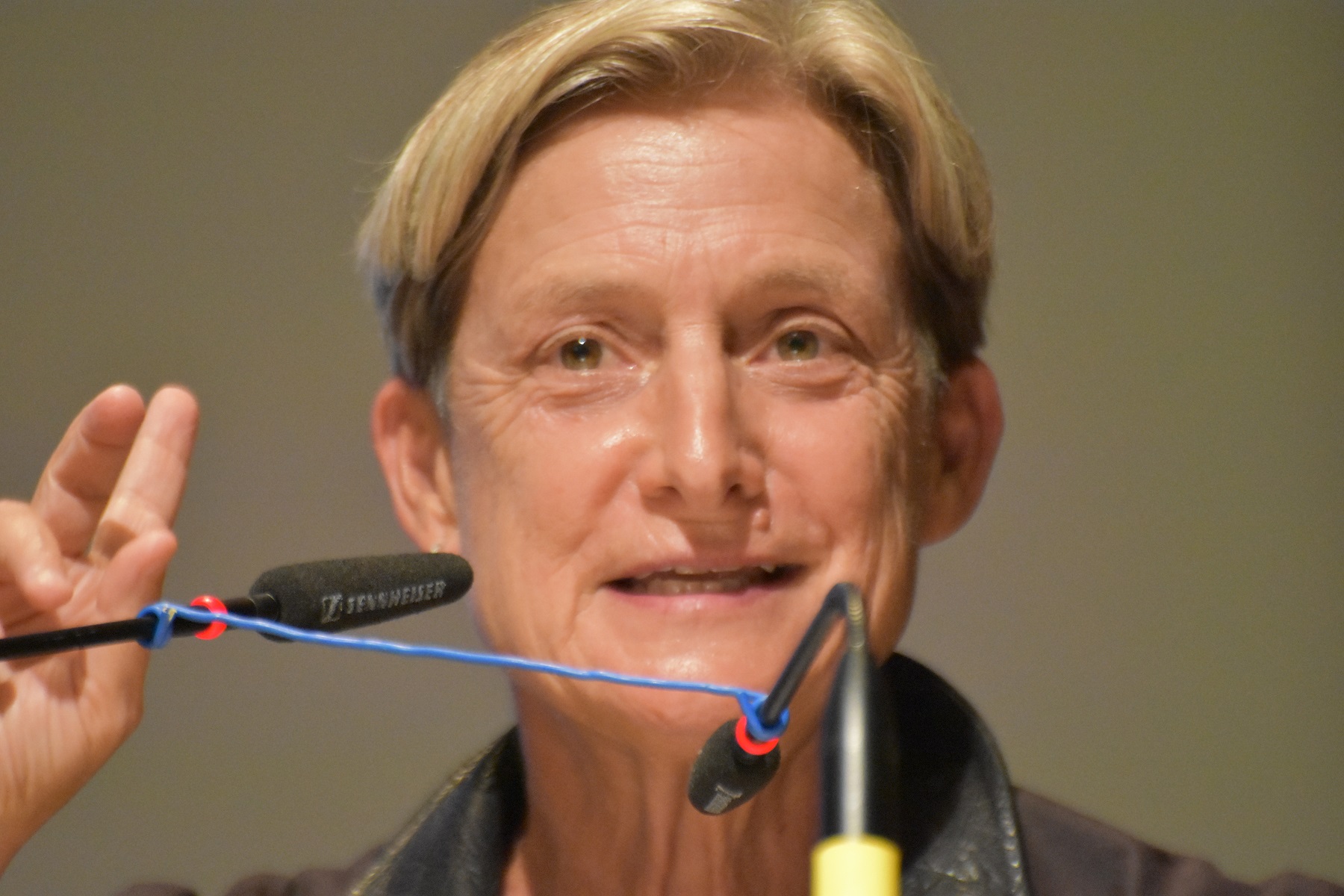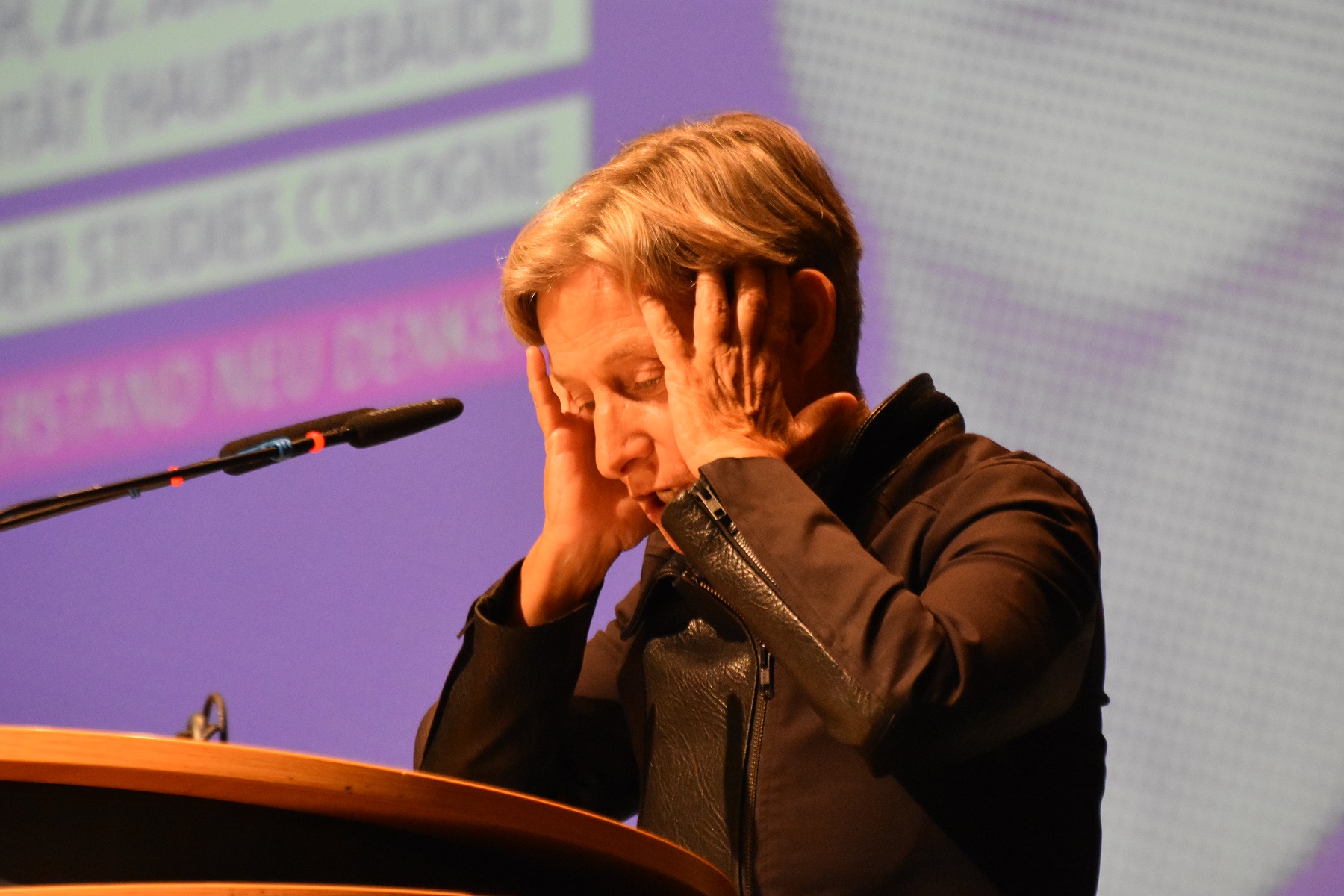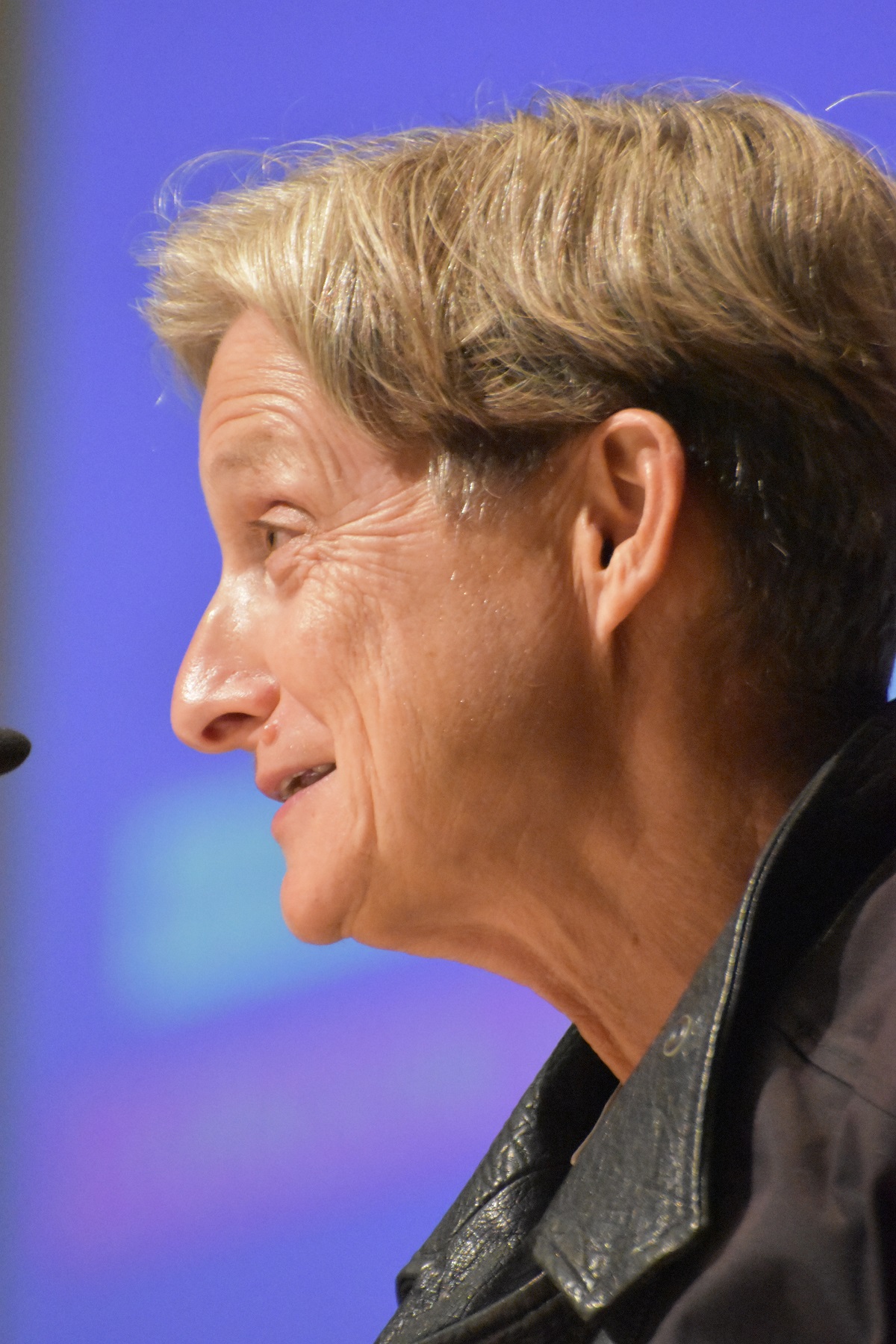Cooperation Judith Butler and GeStiK
The second public lecture by Judith Butler in the context of her Albertus Magnus Guest Professorship at the University of Cologne, "Rethinking Vulnerability and Resistance", was held in cooperation with GeStiK. This was followed by an informal dinner, at which possible future cooperation were also discussed. Precisely because GeStiK focusses on "queer", we are very happy about four days of events and conversations with Judith Butler and the possibility of an intensive and hopefully lasting dialogue.
Science and Activism - Judith Butler in Cologne
Cologne, 10.8.2016
In times of global imbalances and conflicts we become witnesses of increased delimitations and exclusion. Here, science is not only called upon as a descriptive, analytical authority. Rather, it is called upon to address these phenomena and to place itself in the current discourses.
Weeks before her arrival, posters with Judith Butler's face adorned the corridors of the University of Cologne. With her appointment as Albertus Magnus Professor she joined a number of important theoreticians. Noam Chomsky, Martha Nußbaum and Bruno Latour, among others, have been guest professors of the Philosophical Seminar of the University of Cologne. The aim of the professorship is to make important topics of our time accessible to a wider public through public seminars and lectures. This is, as the director of the Thomas Institute, Prof. Andreas Speer, made clear in his welcoming address to the events, a university in its true sense: an "academic state of emergency" linked to ancient teaching traditions. With Butler, a personality now is holding the professorship, whose theories are controversially discussed, but who has also had a strong influence on the academic world and, above all, on the life and everyday life of individuals. This was also expressed in the broad support for Butler's appointment - which was also an important signal for gender and queer studies at the University of Cologne.
For the first time, a cooperation between the central institute GeStiK (Gender Studies in Cologne) and the Philosophical Seminar within the framework of the Albertus Magnus Professorship became possible.
In her first lecture, which Butler, like all other events, held in German, she spoke on "Ethics and Critique of Nonviolence". Here she continued her reflections and insights from Frames of War (2010) and Parting Ways (2013). Thus mournability was at the centre of her remarks: which lives are actually mourned or not and why do these inequalities exist in and between societies? Butler traced this imbalance of mournability in current events, such as the murders of People of Color by white policemen in the USA in recent years. Also the current situation of fugitives shows emphatically which lives would be granted a care and which lives end, without this being taken note of by a broad public.
In the lecture Butler linked the question of mistrustability with the Foucault theorem of biopolitics, through which she illustrated the relations between violence, groups and subjects. Using the supposedly protective figure of self-defense, Butler clarified the discursive logic to which an upgraded self is subjected. According to Butler, in cases of self-defense, any prohibition of killing that we normally recognize as a moral imperative is not absolute. The absurd thing about this is that the defending subject no longer has to adhere to moral and/or institutional powers of instruction. However, cases of self-defence are not necessarily tied to a single subject. According to Butler, there is still an "extended self", i.e. individuals defend persons close to them and in these cases no longer have a universal prohibition of killing.
The "group of the self" would be determined individually by the individual person. The problem would therefore be that people would usually maintain relationships with "similar" or "like" people and thus always create a barrier between "one’s own" and "the other". Because the expanded self and the defence of it no longer require an absolute prohibition of violence, this setting of differences leads to a permanent "potential state of war". Butler found the distinction between "one’s own" and "the other" highly questionable. Furthermore, she made it clear that perfect non-violence is a utopia, which, however, enables important thought processes about non-violent practice and the throwing over of demarcation concepts. In order to overcome these thought patterns, "critical patience" and a constant process of reflection are required, as well as political consequences, which would arise from a certain change in moral attitude.
Butler began her public seminar on the following day with the question of the meaning that right(s) has in her concept of non-violence. She made it clear that violence had to be understood as an "interpretation-strained concept". Thus, the question of the definition of non-violence in the negotiations about rights also arises again and again. The questions asked by the auditorium, who for example were concerned with the assassination attempt in Orlando, but also, for example, with the New Year's Eve events in Cologne, made it clear that Butler's approaches are more topical than ever in view of the current situation in world society.
With her second lecture "Rethinking Vulnerability and Resistance" Butler focused on questions of actions of resistance. She advocated a mobilization of vulnerability that could lead to political movements. She focused on the (infra-)structural vulnerabilities that affect marginalized groups in particular. Amon these included are, for example, being cut off by poor roads and transport routes or a lack of basic services. Being exposed to vulnerability can be an instrument of resistance in order to make certain practices and persons visible - even if the individual makes her_himself vulnerable through her_his own exposure at the same time. Resistance can then serve, for example, to claim the same security of life needs or to draw attention to queer perspectives. Vulnerability would then no longer be understood as a passive inability to act, but would possess empowering potentials. Nevertheless Butler warned that vulnerability always also marks people and can therefore quickly lead to paternalistic gestures of "helping" or "supporting", which does not correspond to the needs of those who expose themselves to vulnerability.
There is still no concrete link between the concept of non-violence and that of vulnerability, as Butler admitted in response to questions. Nevertheless, she made it clear in her remarks that it takes concepts of thought and utopias to critically question one's own actions, to adopt different perspectives and to become aware of vulnerabilities. In Cologne, which after the events on New Year's Eve had become a place of various discourses about "the strangers", but above all revolved around the question of who is considered worthy of protection and who needs to be protected by whom or what, Butler's remarks are of particular relevance. The coverage of the events impressively demonstrated how borders between the own and the foreign can shift and thus also between the ones worthy of protection. Suddenly it was "the others" who were sexist threatening "one’s own women". (White) women* were thus degraded to their position as a commodity worth protecting, to a vulnerable good that had to be protected by paternalistic interventions. Here, too, Butler clearly positioned herself and commented on the question of whether it could be interpreted as an act of resistance to go out on the streets at night as a woman* with "In Cologne? Yes! For it is precisely in this city that exposing oneself to this vulnerability also means resisting the paternalistic attributions of the "worthiness of protection".
For many visitors to the events, Judith Butler once again showed herself to be the central point of reference for an academic practice that does not exclude political activism. In her presentations and discussions Butler argued "against an attitude that plays off differences against each other, positions ass 'one's own' against 'foreign' ones that deniy support to “precarious lives" and instead advocated "an end to the 'politics of similarity' of a homogenized, protected “Us” as Susanne Völker of the central institution for Gender Studies GeStiK put it in her opening speech for the second lecture. Perhaps it is precisely this entry in and the embodiment of a certain attitude that made Butler a "pop star" for many people and why the Cologne events were crowded with so many different people.
After four days of "Butler-Mania" one thing became evident above all: the certainty that gender and queer studies have also found their place in Cologne. And this is not least due to the years of commitment of individual actors who, like Judith Butler, have always been committed to a critical rethinking of established ideas.
Meike Eiberger
University of Cologne, Methods of Educational and Social Research with Special Consideration of Gender Research
This article also appeared on the blog Feminist Studies: http://blog.feministische-studien.de/2016/08/wissenschaft-und-aktivismus-judith-butler-in-koeln/.
